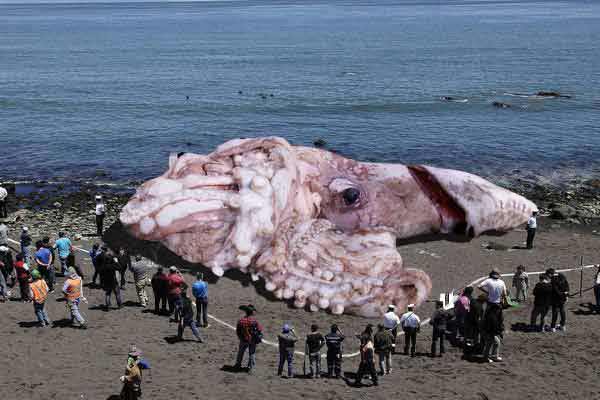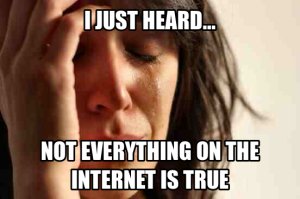

If you frequent social media sites like Tumbler, Facebook, or Google+, chances are, you have recently seen an image like the one of the giant squid (pictured below) making the rounds . Of course, the internet is plagued with photoshopped images that distort our perspective. Often, these images are beneficial; for example, they sometimes help us better understand a cosmic object. Consider the false color images produced by NASA, the ESO, and other similar agencies. Ultimately, these images are not meant to mislead people, but to allow them to differentiate gamma rays from x-rays and other forms of light that are found in the electromagnetic spectrum.
In such cases, digital manipulation increases our understanding and knowledge–it helps us better understand the object in question. But unfortunately, this is not always the case. Often, images are manipulated in a way that increases ignorance and promotes bad science.
THIS JUST IN, NOT EVERYTHING ON THE INTERNET IS TRUE:

The image of this squid is one example of how photos can lie. On Janurary 29th, 2014 Ocean1Life published this photo in an article titled, “Giant Squid Found in California 2014.”
Two troubling facts before we begin: Ocean1Life does not cast itself as a satirical publisher i.e., it is not like The Onion (one of the more popular satirical news outlets); rather, it casts itself as an honest news agency. And this particular article has been “liked” some 2,300 times on Facebook. I really don’t even want to know how often it had been shared, but I do know that it has been posted at least 3 separate times on the From Quarks to Quasars Facebook page.
Now then, in the article, the author asserts, “For the second time in recent months, a giant sea creature has washed ashore in California. First it was a rare oarfish that had grown to a freakish 100-foot length. This time it was a giant squid measuring a whopping 160 feet from head to tentacle tip.”
I cannot stress how wholly inaccurate these statements are. For starters, the largest squid ever recorded was barely a quarter as large, a mere 43 feet (13 meters). Granted, that is still rather large; however, it is hardly 160 feet (48 meters).
Even worse, the article claims that this absurd size is due to radioactivity, and that the scientific community is terrified.
First, radioactivity causes cancer and tumors. It does not give you super powers. It will not turn you into a giant. The movies are not real, and neither are the comic books–Radioactivity makes you die. It does not make you awesome. Second, squid live in the sea. They are not going to come trouncing through New York City and eat everyone. So why would the scientific community be worried? Ocean1Life has the answer: ““Take Jaws but make him the size of a Manhattan skyscraper…if that guy took a wrong turn onto the coastline he could level 40 city blocks thrashing before he comes to rest.”
WHAT?
Skyscrapers are generally around 1,000 feet tall (300 meters). This squid (which, just to remind you, does not actually exist) is supposed to be 160 feet tall. Now, I may not be very good at math (I am actually rather good at math), but 160 feet seems to be a far cry from the actual height of a skyscraper…unless maybe it is a skyscraper made for smurfs.
The ramification of this article might not seem too troubling at first….so a few people think that giant squid are a tad more giant than they actually are. So what? Well, unfortunately, it’s not quite that simple. You see, the entire premise of the “gigantic squid” is based off of the Fukushima nuclear incident, an incident that has already been blown way out of proportion. Now, before anyone gets upset with me, allow me to clarify: Yes, Fukushima is worrying. Yes, there is a radiation leak, and we should absolutely take it seriously. However, we should not promote fear mongering or sensationalism. And that is precisely what is happening. The incident has been greatly exaggerated from a variety of sources.
Didn’t you hear, the world’s about to end?

Take this image, for example, taken from Before It’s News. This is another example of the sensationalism that surrounds radioactivity. First, that is as large as the image gets. Notice that there is no information given as to what we are looking at. There is just a bunch of scary bright colors that imply doom and gloom. There are numbers on the right side of the image, but they are far too small to read. The accompanying text is even worse. Take the title, “Could the Fukushima Radiation Leaks Kill the Pacific Ocean’s Food Chain?”
What?!? Are you really asking that? No. No, it can’t. Not even a little. No scientist (or serious news agency) would ask that question.
The article goes on to talk about how Harvey Wasserman, a journalist and advocate for renewable energy, claims that “This is an apocalyptic event. This is something that could contaminate the entire Pacific Ocean. It is extremely serious.”
No, Harvey. It’s not. First, an “apocalyptic event” is literally “a great disaster signaling the the imminent destruction of the world.” Fukushima is not going to destroy the planet. Second, the World Health Organization (which utilizes actual scientists for research, not journalists) stated in this 2011 publication that the effective doses from the accident for those who live outside of Japan are considered to be below (or far below) the dose levels regarded as very small by the international radiological protection community. What’s more, in 2013 the WHO reported that area residents who were evacuated were exposed to so little radiation that radiation induced health impacts were likely to be below detectable levels.
Of course, at the very bottom of the article, the author clarifies that this information may be wholly inaccurate as Professor Christopher Busby asserts that ” the Pacific Ocean is big enough for this level of release not to represent the global catastrophe that some are predicting.” If you are wondering, Christoper Busby is an expert on the health effects of ionizing radiation and Scientific Secretary of the European Committee on Radiation Risk (credentials that are a bit more impressive than Wasserman’s).
But to reiterate my main point, Fukushima should be taken seriously. No one is arguing otherwise. We should not mock this event or the ramifications that it could have. There is cause to worry about those “high risk” individuals who were exposed to the radiation, and we need to seriously advocate for stronger regulations for nuclear plants. However, unless you were in Fukushima during the disaster, you are not “high risk.”
Of course, just to be safe, the United States is testing for radioactivity in kelp and fish, as are many other nations. That is only sensible. And therein lies the key. We’ve no need to sensationalize or fear-monger. Rather, we should promote the facts as they are. We should use these facts and figures to reinforce our arguments, explain how things stand, and allow people to make their own informed assessments. To that end, it is each person’s responsibility to make informed judgments–to conduct research, to not simply go along with the first article that one reads or the article that sounds most interesting.
In short, please research and read before you “like” or “share.”